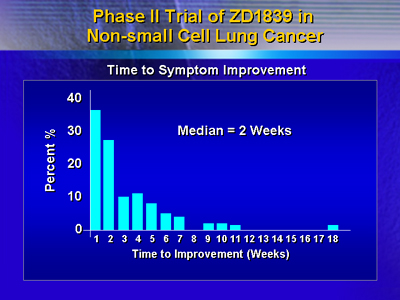|
Agents that target epidermal growth factor
receptor (EGFR) may help improve therapy for non-small cell
lung cancer (NSCLC) beyond standard chemotherapy alone. Investigators
have evaluated several of these agents as single agents or in
combination with chemotherapy. Possible future investigations
may evaluate EGFR inhibitors as adjuvant therapy, as initial
therapy for patients unable to tolerate chemotherapy or as chemoprevention
.
Combination chemotherapy has been extensively studied in
NSCLC. In order to improve upon overall response rate and
survival , investigators have begun to study drugs that are
mechanistically different and complementary to cytotoxic chemotherapy.
One promising approach is to use drugs that target the epidermal
growth factor receptor (EGFR). Drugs that target EGFR block
the effects of this receptor, inhibiting growth and proliferation
of cells. They also enhance apoptosis.
EGFR regulates growth for many cell types. Most NSCLC express
EGFR and its natural ligand, transforming growth factor alpha.
Overexpression of EGFR is common in squamous cell carcinomas
and late stage NSCLC. Overexpression of EGFR has also been
seen in adenocarcinomas , large cell carcinomas and some early
stage lung cancers
Investigators have looked at several EGFR inhibitors in
phase I studies of NSCLC. These include cetuximab (C225, Erbitux),
erlotinib (OSI-774, Tarceva) and gefitinib (ZD1839, Iressa).
Phase II studies of erlotinib and gefitinib have been completed.

There have also been phase I combination studies of gefitinib
with paclitaxel plus carboplatin, and gefitinib with gemcitabine
plus cisplatin. Phase III trial results for gefitinib with
chemotherapy was presented at the ASCO meeting.
Studies of EGFR Inhibitors: Current
Status
| - | Phase
I | Phase
II |
Phase III(EGFR inhibitor + chemotherapy) | | Gefitinib
(ZD1839, Iressa®) | Completed | Completed | Completed | | Erlotinib
(OSI-774, Tarceva) | Completed | Completed | Underway | | Cetuximab
(C225, ErbituxTM) | Completed |
- | - |
|
Not all patients with tumors that express EGFR derive clinical
benefit from these targeted agents. No one yet understands
why only selected tumors respond. Researchers hope that with
advances in technology they will be able to identify patients
in whom EGFR is critical for regulating cancer growth.
Possible future investigations include the use of EGFR inhibitors
in postoperative or other adjuvant settings. In addition,
these agents might be used as initial therapy for patients
who cannot receive chemotherapy due to comorbid disease or
poor functional status.
Some intriguing preclinical investigations suggest a potential
role for EGFR inhibitors as chemoprevention agents. In the
United States, the lung cancer Specialized Programs of Research
has proposed a trial to evaluate gefitinib as chemoprevention
for individuals who are at high risk for NSCLC.
|